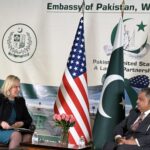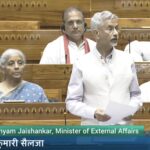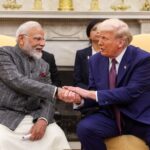The U.S. Department of State has acknowledged that tensions between India and Pakistan could have escalated into “something quite horrible,” crediting senior American leaders for their swift intervention to deescalate the situation.
“We had an experience with Pakistan and India when there was a conflict, one that could have developed into something quite horrible,” said State Department Spokesperson Tammy Bruce during a departmental briefing on August 12, 2025.
Recalling her time at the State Department during the crisis, Bruce highlighted the “immediate concern and immediate movement” by Vice President JD Vance, President Donald Trump, and Secretary of State Marco Rubio in addressing the unfolding events.
“Many of you who were in the room in the days afterward, we described the nature of the phone calls, the work that we did to stop the attacks, and to then bring the parties together so we could have something that was enduring,” she said. “And it’s a very proud moment and a very good example of what Secretary Rubio is committed to, of Vice President Vance in that, of course, case as well, but our – the top leaders in this nation involved in stopping that potential catastrophe.”
When asked about the nature of U.S. relations with India and Pakistan, Bruce said, “I would say that our relationship with both nations is as it has been, which is good, and that is the benefit of having a president who knows everyone, talks to everyone, and that is how we can bring differences together in this case.”
She emphasized the ongoing commitment of U.S. diplomats to both countries, referencing the U.S.-Pakistan Counterterrorism Dialogue. During the latest round of talks in Islamabad on August 12, both nations reaffirmed their shared commitment to “combatting terrorism in all its forms and manifestations.”
“The United States and Pakistan discussed ways to enhance cooperation to counter terrorist threats. And I think that for the region and for the world, the United States working with both those nations is good news and will promote a future that’s beneficial,” Bruce added.
Bruce also pointed to recent peace initiatives led by President Trump, including the signing of a historic joint declaration between Armenia and Azerbaijan at the White House last week.
“The declaration of peace between Armenia and Azerbaijan has reaffirmed that President Trump is indeed the president of peace,” she said, noting that the leaders also signed bilateral economic agreements with the United States, “unlocking the great potential of the South Caucasus region in trade, transit, energy, infrastructure, and technology; and creating new opportunities for the American people and American businesses.”
She said this achievement follows “negotiated peace arrangements” between Cambodia and Thailand, Israel and Iran, Rwanda and the Democratic Republic of the Congo, India and Pakistan, Egypt and Ethiopia, and Serbia and Kosovo, as well as the Abraham Accords.
“President Trump continues to prove that nations across the globe can move beyond longstanding conflicts of the past toward a shared future of peace, prosperity, and success,” Bruce concluded.






